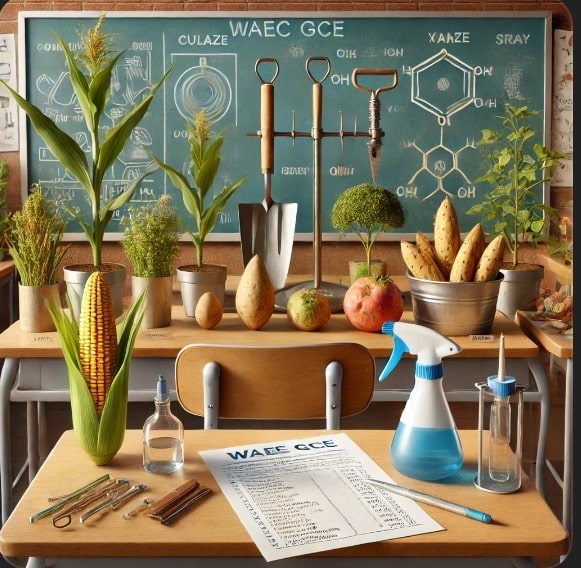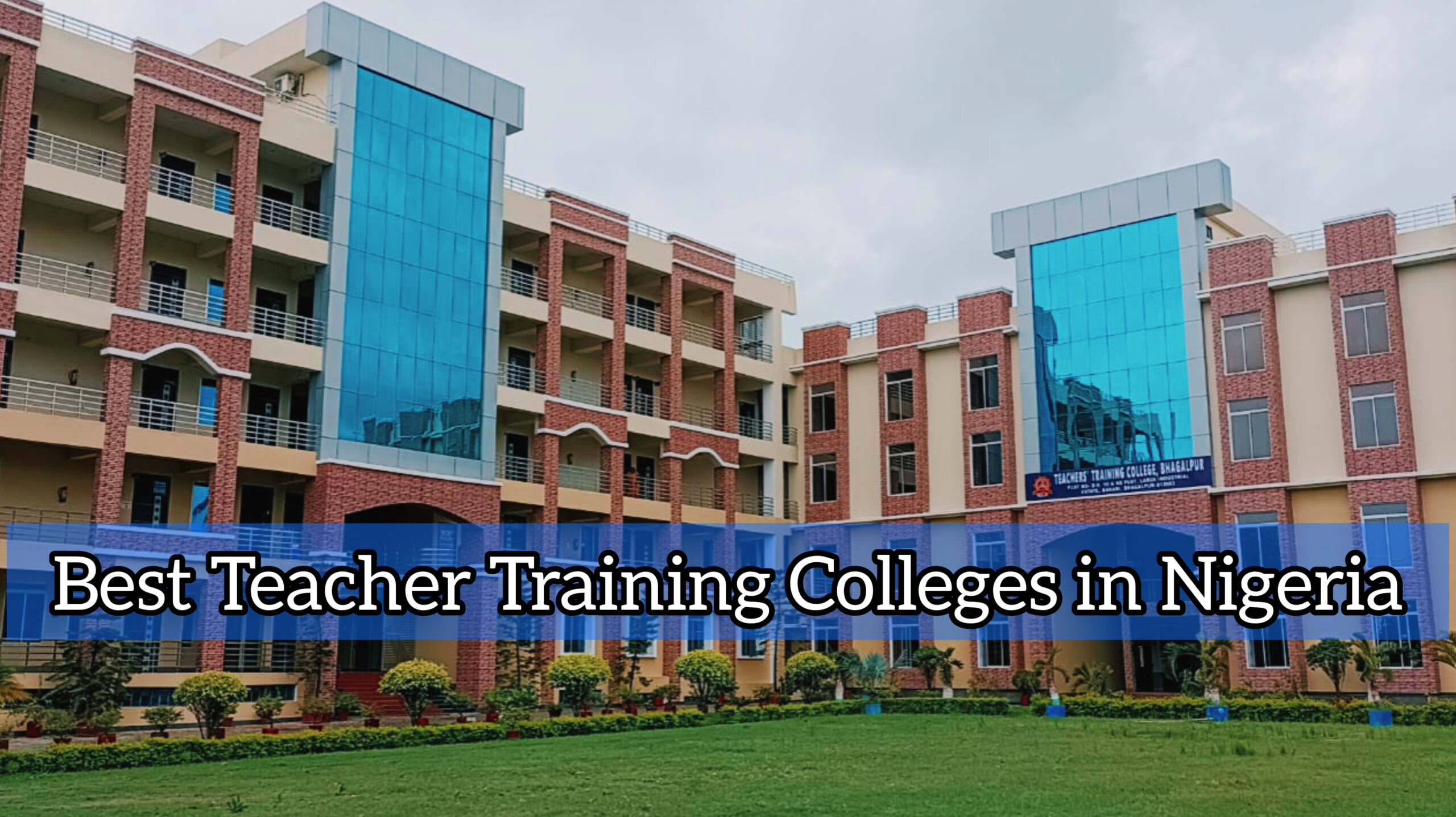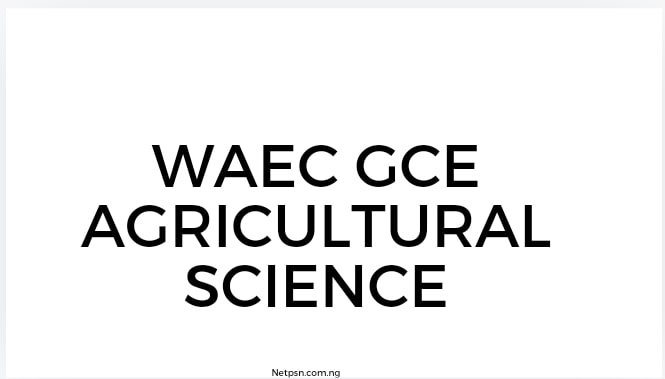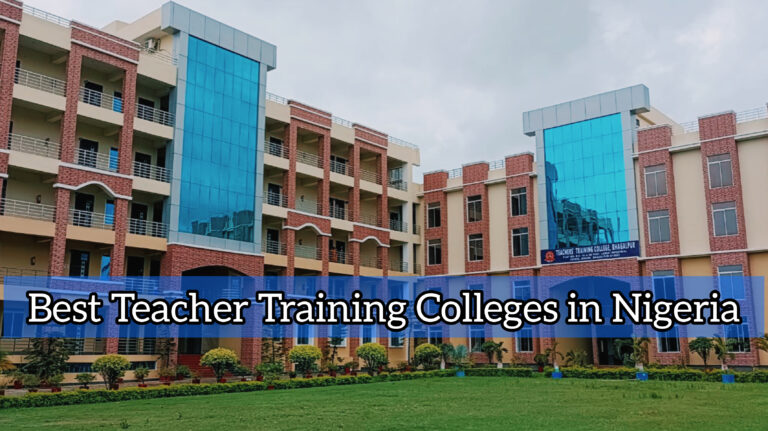Agricultural Science is a crucial subject for students in the West African Examinations Council’s (WAEC) General Certificate Examination (GCE). The Alternative to Practical section, often referred to as the “Objective Test,” tests students’ understanding of practical skills without requiring hands-on laboratory work. This syllabus guide provides an in-depth look into the WAEC GCE Agricultural Science Alternative to Practical syllabus, with tips on how to excel in each area.
Overview of WAEC GCE Agricultural Science Practical

The WAEC GCE Agricultural Science Practical (Alternative) is a structured test designed to assess a student’s comprehension of essential agricultural techniques and processes.
It evaluates theoretical understanding, interpretation of diagrams, and analysis of case studies related to agriculture without requiring an actual laboratory setting.
Importance of Practical Skills in Agricultural Science
Understanding agricultural practices practically is essential for students pursuing careers or further studies in agricultural science. Although the WAEC GCE Agricultural Science provides an alternative to practicals, a strong grasp of concepts in plant science, animal husbandry, and agricultural machinery is vital.
This knowledge prepares students to think critically about agriculture and fosters skill development for real-world applications.
Syllabus Structure for Alternative to Practical
The syllabus covers a variety of practical areas within agricultural science. The topics include but are not limited to:
- Plant and Crop Production
- Animal Production and Health
- Soil Science and Management
- Farm Mechanization and Machinery
Each topic in the syllabus is represented by questions that evaluate observation, analysis, and identification skills related to agricultural activities and tools.
Key Topics Covered in the Syllabus
A. Plant Studies
1. Crop Identification and Classification
- Focus: Identifying common crops, their characteristics, and uses.
- Example Crops: Maize, cassava, yam, and vegetables.
- Key Skills: Observation of features such as leaf shape, root types, and growth conditions.
2. Pest and Disease Control
- Focus: Recognizing crop pests and diseases.
- Study Areas: Identifying symptoms of crop disease and understanding pest control methods.
- Practical Skills: Diagram interpretation, such as reading insect structures and pest behavior.
3. Fertilizer Application
- Focus: Knowledge of various fertilizers and their uses.
- Skills: Identifying nitrogen, phosphorus, and potassium sources, with a focus on organic and inorganic fertilizers.
B. Animal Husbandry
1. Livestock Management
- Focus: Understanding the basics of livestock rearing and management.
- Key Areas: Housing, feeding, breeding, and disease prevention.
- Skills: Identifying structures in livestock housing and equipment.
2. Animal Anatomy and Physiology
- Focus: Basic knowledge of animal anatomy related to productivity.
- Skills: Diagram interpretation for identifying body parts relevant to functions such as digestion and reproduction.
3. Disease Control in Livestock
- Focus: Identifying and controlling diseases in common livestock.
- Examples: Foot-and-mouth disease, Newcastle disease.
- Skills: Familiarity with treatment techniques and basic veterinary equipment.
C. Soil Science
1. Soil Types and Composition
- Focus: Understanding soil structure, texture, and composition.
- Skills: Identifying sandy, loamy, and clay soils from descriptions or images.
2. Soil Fertility Management
- Focus: Fertility practices that enhance crop productivity.
- Skills: Analysis of soil fertility diagrams and identifying fertilization needs.
3. Erosion Control
- Focus: Methods to prevent soil erosion and degradation.
- Examples: Terracing, crop rotation, and mulching.
D. Agricultural Mechanization
1. Farm Machinery
- Focus: Identifying different types of farm machinery and their functions.
- Examples: Tractors, plows, and harvesters.
- Skills: Knowledge of each machine’s function and maintenance.
2. Tools and Equipment
- Focus: Identifying smaller farm tools and their uses.
- Examples: Hoes, sickles, rakes.
- Skills: Diagram labeling and understanding tool functions.
Exam Preparation Tips for Practical Topics
- Understand Each Topic Thoroughly: Focus on each topic area, particularly those involving diagrams and specimen identification.
- Use Diagrams for Better Visualization: Practice sketching and labeling diagrams to aid in quick identification during exams.
- Review Past Questions: Go through past papers to familiarize yourself with question formats and frequently tested concepts.
- Use Mnemonics for Memorization: Create mnemonic devices to remember lists, such as types of soil or crop diseases.
- Engage in Study Groups: Discussing topics with peers can help reinforce understanding and improve recall during exams.
WAEC GCE Agricultural Science: Recommended Study Materials
- WAEC Agricultural Science Past Questions: For understanding question patterns.
- Textbooks: Texts such as “Essential Agricultural Science” and “New School Agricultural Science” offer comprehensive coverage.
- Online Resources: Websites like Agriknowledge.org provide diagrams and tutorials that may help in better understanding practical concepts.
Conclusion
Mastering the WAEC GCE Agricultural Science Alternative to Practical syllabus is achievable through dedicated study and understanding of each topic.
With a focus on diagram identification, understanding of agricultural tools, and practical application of scientific methods, students can perform exceptionally well in this section.
Combining theoretical knowledge with interpretative skills is the key to succeeding in this alternative to practical examination.
Frequently Asked Questions (FAQs)
1. What is the WAEC GCE Alternative to Practical?
The WAEC GCE Alternative to Practical is a substitute exam section for students who do not have access to laboratory facilities, allowing them to showcase their practical knowledge through theory-based questions.
2. How can I prepare for the Alternative to Practical in Agricultural Science?
Focus on understanding the syllabus topics, practicing with past questions, studying diagrams, and learning to identify tools and plants.
3. Are diagrams important in the Alternative to Practical section?
Yes, diagrams are crucial as they test identification and interpretation skills. Practicing with labeled diagrams helps reinforce memory and understanding of agricultural practices.
Also Read: WAEC Further Mathematics: Key Topics and Study Tips

















+ There are no comments
Add yours